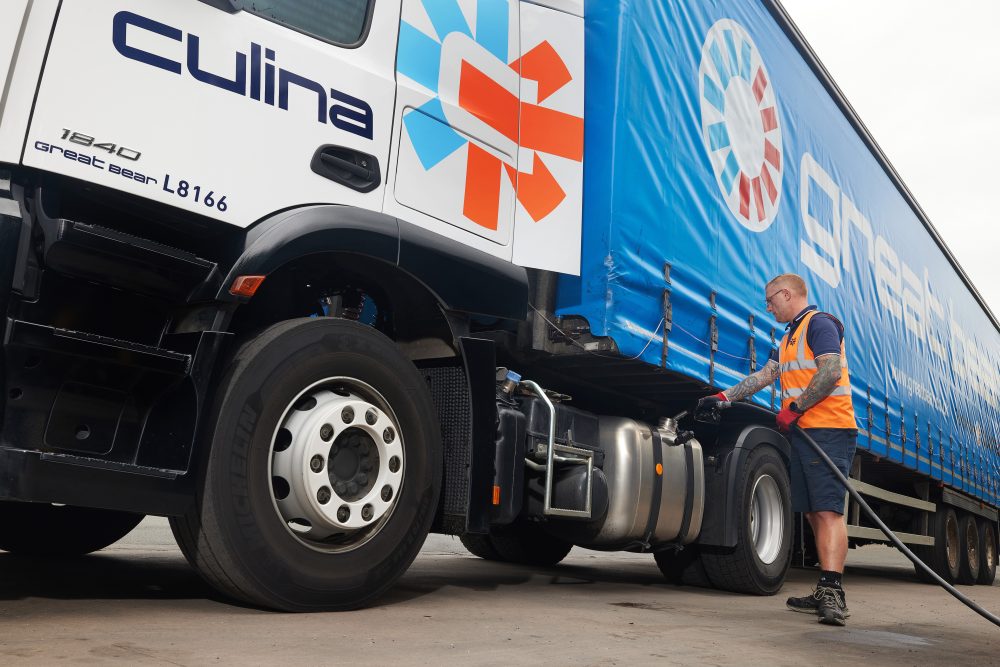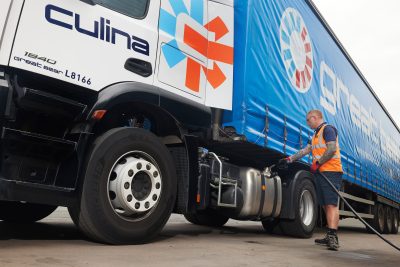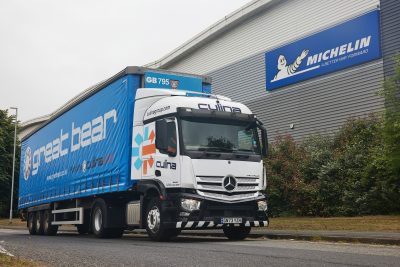- Tyre manufacturer’s radial distribution fleet in the UK begins fuelling with a renewable, sustainable and 100 per cent biodegradable fuel
- 1,024 tonnes of CO2 to be saved by year-end
Michelin will unlock a 30 per cent reduction in CO2 emissions across its Stoke-on-Trent-based logistics fleet this year, after securing 400,000 litres of hydrotreated vegetable oil (HVO) to use in place of diesel between now and the end of the year.
The cleaner burning fuel is projected to save 1,024 tonnes of CO2 from being released into the atmosphere and has been sourced through Crown Oil. It will be used to power 50 HGVs operated by long-time 3PL partner Great Bear, a division of Culina Group, which delivers new tyres and retreads from Michelin’s Stoke-based European Distribution Centre and Remix factory to distribution hubs nationwide – covering 3.4 million miles per year.
John Howe, Managing Director of Michelin Tyre plc, says: “We held a series of think tanks looking at ways to reduce CO2 emissions from our radial distribution fleet, and HVO came out on top. From a practical perspective, the fact it can be used as a drop-in fuel, and was available immediately, made this an easy decision to make.
“With any change in strategy, it’s often the first step which is most critical, as this gives you the inertia and momentum to continue. We’re now topping up our bunkered fuel facility with 35,000-litres of HVO at a time, and every tanker load translates into a 2.62 per cent reduction in our fleet’s annual CO2 emissions. By year-end, we’ll have reached our initial target of a 30 per cent saving.”
Looking ahead, he adds: “If the trial proves successful, and we’re very confident it will, we will have the ability to flex our investment in HVO to unlock even greater environmental savings in the future.”
The move to trial HVO follows steps already taken by Michelin at an international level to fuel its overland fleet – those delivering product from the factory to country-based distribution centres – with HVO.
It’s a decision which directly supports the company’s commitment to achieve net zero emissions by 2050, with the plan to achieve an initial 50 per cent reduction in CO2 emissions by 2030, versus 2010 levels.
Michelin’s ambitious aims have been approved by the Science Based Targets initiative (SBTi), an independent international organisation which encourages participating companies to set greenhouse gas (GHG) emissions-reduction targets. The SBTi is a partnership between the CDP (formerly the Carbon Disclosure Project), the United Nations Global Compact, the World Resources Institute (WRI) and the WWF (previously named World Wildlife Fund).
In addition to fuelling the rigid and articulated trucks with HVO, the bunkered supply in Stoke will also power the terminal tractors which carry out most trailer movements across the two sites. Michelin’s dedicated fire appliance will also be running on HVO.
The introduction of HVO comes just a few months after Michelin began the first phase of its electric vehicle (EV) transition programme within the van fleet operated by its Services and Solutions division, taking delivery of 17 Vauxhall Combo vans. The electric vans are part of plans to move the division’s 54-strong fleet to electric by 2026.
About Michelin
Michelin’s ambition is to sustainably improve its customers’ mobility. The leader in the mobility sector, Michelin designs, manufactures, and distributes the tyres best suited to their requirements and uses as well as services and solutions to improve transport efficacy. With its offers Michelin allows its customers to enjoy unique moments when traveling.
Michelin also develops high-technology equipment intended for multiple fields. Based in Clermont-Ferrand, Michelin is present in 175 countries, employs 132,200 people and operates 67 tyre factories that, together, produced approximately 200 million tyres in 2022. (www.michelin.com)
More information on how Michelin assists transport businesses achieve its sustainability goals and run more efficiently can be found at business.michelin.co.uk.
MICHTLD&URB/556/24





